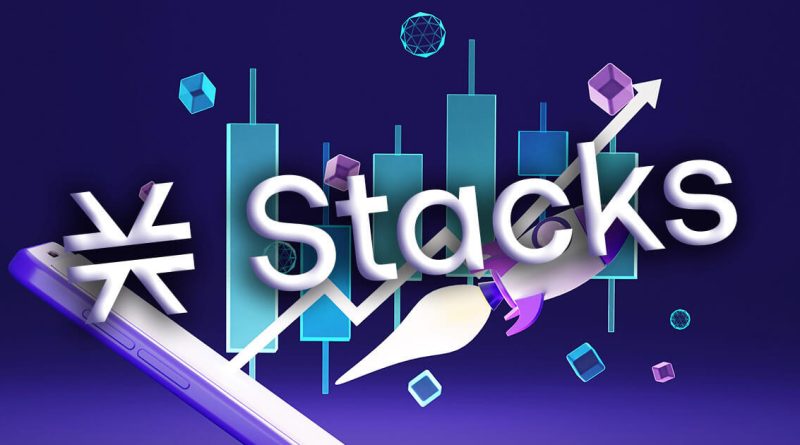What is Stacks (STX) & Why Has It Rallied This Year?
STX has been gaining a lot of attention recently due to its impressive price rally at the startof the year. In this article, we will explore what Stacks (STX) is and why it has rallied this year.
What Is Stacks (STX)?
Stacks is a layer-1 blockchain solution built to bring smart contracts and decentralized applications (dApps) to the Bitcoin network. It aims to empower a decentralized internet, allowing developers to build Web 3.0 applications directly on Bitcoin, rather than relying on other blockchains.
The native token of the Stacks ecosystem is STX, which is used for transaction fees, executing smart contracts, and participating in the network’s consensus mechanism. To use STX, users require a dedicated Stacks Wallet.
The Stacks 2.0 Blockchain
The Stacks 2.0 blockchain, launched in January 2021, brought significant improvements over its predecessor Stacks 1.0. The upgrade introduced the Clarity smart contract language, which emphasizes predictability, security, and developer-friendly features.
Additionally, the new blockchain uses a novel consensus mechanism called Proof of Transfer (PoX), which leverages Bitcoin’s Proof of Work (PoW) to secure the Stacks network, fostering a symbiotic relationship between the two blockchains.
Proof of Transfer (PoX)
The PoX consensus mechanism allows Stacks miners to mine new STX tokens by transferring Bitcoin to participating STX holders in a process called “Stacking.” Stacking enables STX holders to earn Bitcoin rewards while supporting the network’s security. This innovative consensus mechanism reduces the environmental impact associated with traditional PoW mining, as it eliminates the need for energy-intensive computational processes.
Reasons Behind the STX Rally in 2023
Several factors have contributed to the rally of STX in 2023. Let’s take a look at some them.
Growing Adoption of Smart Contracts on Bitcoin
As the Stacks blockchain enables smart contracts and dApps to be built directly on the Bitcoin network, it has attracted significant interest from developers and businesses. This has led to an increase in demand for STX tokens, as they are required to interact with the network’s smart contracts.
Decentralized Finance (DeFi) Expansion
DeFi has continued to gain traction in the cryptocurrency space, and Stacks plays a crucial role in bringing DeFi applications to the Bitcoin network. As more DeFi projects are built on Stacks, demand for STX tokens has surged, contributing to the rally.
ESG and Environmental Concerns
As environmental, social, and governance (ESG) concerns have become more prominent in the investment landscape, Stacks has emerged as an attractive option due to its reduced environmental impact compared to traditional PoW mining. The PoX consensus mechanism allows for more sustainable network security, which has garnered interest from eco-conscious investors.
Strategic Partnerships and Integrations
Stacks have formed strategic partnerships and integrations with various cryptocurrency exchanges, wallets, and other ecosystem players, further increasing STX’s accessibility and utility. These collaborations have played a pivotal role in the growth of the Stacks ecosystem and the rally of the STX token.
Strong Fundamentals
One of the main reasons behind Stacks’ price rally is its strong fundamentals. Stacks has a strong development team, a growing ecosystem of dApps, and a unique consensus mechanism that allows STX holders to earn Bitcoin rewards. Stacks also has partnerships with several big players in the cryptocurrency industry, including Binance, Blockchain.com, and Huobi.
Increased Interest in Bitcoin Layer 2 Solutions
Another factor behind Stacks’ rally is the growing interest in Bitcoin layer 2 solutions. Bitcoin’s slow transaction speeds and high fees have made it challenging to use for small transactions. Layer 2 solutions, like Stacks, allow developers to build dApps on top of the Bitcoin blockchain, providing a solution to these issues.
Growing Ecosystem
Stacks has a growing ecosystem of dApps that are built on top of its blockchain. Some of the most popular dApps on the Stacks network include the Clarity smart contract language and the Stacks Wallet. The growth of the Stacks ecosystem has increased demand for STX tokens, driving up the price.
Increased Attention from Retail Investors
Stacks’ price rally has also attracted the attention of retail investors. As more people learn about the Stacks network and its unique features, they are becoming more interested in investing in STX tokens. This increased demand from retail investors has contributed to the price rally.
Conclusion
Stacks (STX) is a blockchain network that uses the Bitcoin blockchain as a settlement layer to create decentralized applications (dApps). Stacks’ unique consensus mechanism, Proof of Transfer (PoX), allows miners to earn Bitcoin rewards by locking up their STX tokens, which helps to secure the network. STX is also used for governance and transaction fees on the network. Stacks has experienced a significant rally this year, with the price of STX increasing from around $0.20 in January to over $$0.87 in April. While Stacks’ price rally is impressive, it is essential to note that the cryptocurrency market is highly volatile, and prices can fluctuate rapidly. Therefore, it is always crucial to conduct thorough research before investing in any cryptocurrency. Additionally, it is important to diversify your portfolio and not invest more than you can afford to lose.
Post Views: 691

